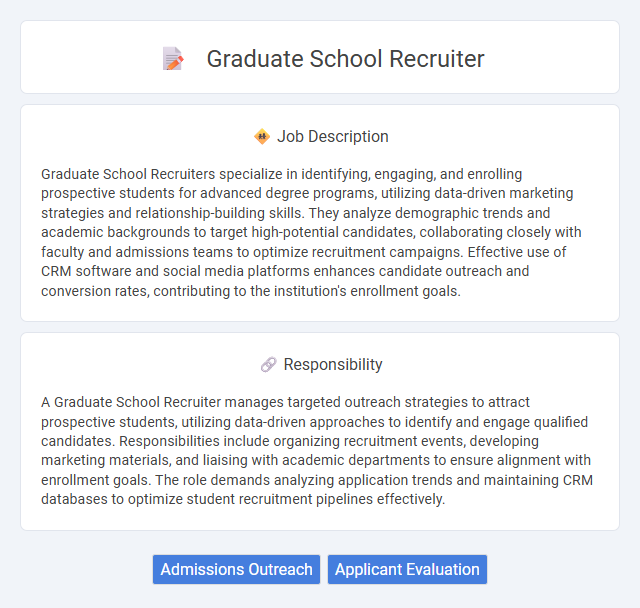
Graduate School Recruiters specialize in identifying, engaging, and enrolling prospective students for advanced degree programs, utilizing data-driven marketing strategies and relationship-building skills. They analyze demographic trends and academic backgrounds to target high-potential candidates, collaborating closely with faculty and admissions teams to optimize recruitment campaigns. Effective use of CRM software and social media platforms enhances candidate outreach and conversion rates, contributing to the institution's enrollment goals.
Those with strong interpersonal skills and a genuine interest in higher education recruitment are likely to excel as Graduate School Recruiters. Individuals who are comfortable networking, managing multiple tasks, and adapting to dynamic environments may find this role particularly suitable. Candidates who thrive in goal-oriented settings and possess effective communication abilities probably have a higher chance of success in this position.
Qualification
Graduate School Recruiters typically require a bachelor's degree in marketing, communications, or a related field, with a preference for candidates holding a master's degree in higher education administration or business. Proven experience in recruitment, strong interpersonal skills, and knowledge of graduate programs are essential qualifications. Proficiency in CRM software, excellent communication abilities, and a strategic mindset to attract diverse student populations enhance job performance.
Responsibility
A Graduate School Recruiter manages targeted outreach strategies to attract prospective students, utilizing data-driven approaches to identify and engage qualified candidates. Responsibilities include organizing recruitment events, developing marketing materials, and liaising with academic departments to ensure alignment with enrollment goals. The role demands analyzing application trends and maintaining CRM databases to optimize student recruitment pipelines effectively.
Benefit
A Graduate School Recruiter likely benefits from developing strong networking skills and gaining extensive experience in student engagement strategies. The role probably offers opportunities for career advancement within educational institutions and potentially provides competitive salaries with performance-based incentives. Access to professional development resources and the chance to impact students' educational paths may also be significant advantages.
Challenge
Graduate School Recruiter roles may present challenges in identifying and engaging diverse, qualified candidates across various regions and backgrounds. The probability of facing stiff competition from other institutions could require innovative outreach strategies and strong relationship-building skills. Adapting recruitment methods to evolving educational trends and student preferences might be essential for success in this role.
Career Advancement
Graduate School Recruiters specialize in identifying and attracting top-tier candidates for advanced academic programs, leveraging strategic outreach and relationship-building skills. Their role is crucial for enhancing enrollment quality, which directly impacts institutional reputation and funding opportunities. Career advancement opportunities include transitioning into higher education administration, enrollment management, or academic advising, offering leadership roles that influence university recruitment strategies and student success initiatives.
Key Terms
Admissions Outreach
Graduate School Recruiters specializing in Admissions Outreach develop strategic communication campaigns to attract prospective students by highlighting program benefits and career outcomes. They collaborate with academic departments to organize informational sessions, campus tours, and virtual events that increase applicant engagement and diversity. Utilizing CRM tools and data analytics, these recruiters track outreach effectiveness and optimize recruitment strategies to meet enrollment targets.
Applicant Evaluation
Graduate School Recruiters specialize in applicant evaluation by assessing academic records, extracurricular achievements, and personal statements to identify candidates who meet program criteria. They utilize data-driven tools and behavioral interviews to accurately gauge applicant potential and alignment with institutional values. Ensuring a balanced selection process, recruiters collaborate with admissions committees to maintain diversity and uphold academic standards.
 kuljobs.com
kuljobs.com